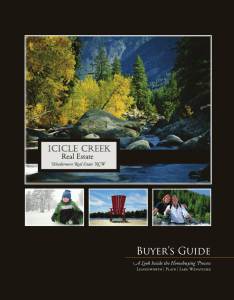Wenatchee- It’s not easy being green
Thanks to Andy Dappen of WenatcheeOutdoors.org for letting me post this great article. When I read the front page news about a “Green Wenatchee” I too was a little disturbed.
Ten Reasons We’re Not No. Five
Andy Dappen
If only it were true. Unfortunately, all I can say about the March 2007 issue of Country Home magazine that ranked Wenatchee as the fifth greenest city in America is, “What were they smoking?” An odd amalgamation of statistics compiled by those who don’t live here have found Wenatchee wonderfully green, but rather than congratulating ourselves and then turning our patted backs from some real environmental transgressions, we still have very basic ground to cover to deserve our ranking.
Here are ten reasons we’re not No. 5:
1) We can’t even place colored glass in our curbside recycling bin. Microbrews and recycling go hand-in-hand. Did you know that the New Belgium Brewing Company (makers of Fat Tire Beer) generates all the energy used to make their beers through wind power? That’s cool, but around Wenatchee, the No. 5 city, you’ll end up throwing the bottle of that responsibly made beer right into the landfill. What’s a rummy environmentalist to do? You can buy less tasty beers in clear bottles. Or you can drive your colored glass out to Cashmere to recycle it. Kudos here belongs to Cashmere, not Wenatchee.
2) No curbside recycling of anything greater than plastic #1 (except milk bottles). That means a high percentage of our plastic consumption goes straight into the landfill.
3) And that’s OK because when I jog around the city on trash day, the majority of our residents don’t use their curbside recycling bins anyway. Here’s why: Unlike many cities, there are no differential rates for how much garbage gets picked up each week. If you’re lazy and, frankly, most of us are, you ignore all the sorting and chuck all your recyclables into your jumbo-sized garbage bin. That’s fine because, hey, you’re not charged extra. Heck, if the jumbo-sized garbage bin runneth over, you can even stack extra Glad Bags of refuse beside the bin, at no extra cost. This would all change if we paid a small rate for a small trashcan’s worth of waste each week and a large rate for a big trashcan’s worth of garbage. Economics would wring the laziness out of us and we’d start recycling so that we could fit the week’s garbage into that small, cheap can.
4) Related to our personal trash, there’s the matter of dealing with the grass clippings, leaves, and branches our yards produce each year. Few of us compost the material — that takes effort and compost piles are unsightly in nicer neighborhoods. Unlike many cities, we don’t have green bins allowing waste management to collect and deliver our organic matter to a community composting center. And there is no nearby composting center where we can drop off of our organic waste (the only such center is in Dryden). But who really worries about this anyway? We’ve got those monstrous, flat-fee garbage bins, so we blithely toss our organic matter in with our inorganic waste and our unsorted recyclables, and off to the landfill it all goes.
5) According to our No. 5 ranking, we’re a bicycling haven. That’s why the effort to build a five-mile bicycle trail from the Loop to Lincoln Rock State Park (Rocky Reach Dam) on state-owned easements has taken us over a decade of wrangling and is still tied up in litigation. Something that’s good for public health, public transportation, local economics, local lifestyle, and regional recognition has been continually torpedoed because we’re so green.
6) At least our yards are green because, thanks to irrigation systems like the Highland Canal (built 100 years ago when we had a hundredth of the population) many residents of the city can pour as much river water as they want on their lawns for the flat fee of about $70/year. Never mind that their yards are planted with Kentucky Bluegrass which, in our climate, is as thirsty as a wandering man lost in the desert. Never mind that their sprinklers are shooting water into the wind and heat of a summer’s day at noon. It’s a flat fee so why worry about treating desert water like a scarce resource?
7) One thing we do care about is our low power rates. Suggest anything that threatens that golden cow – like discuss more wildlife mitigation or recreation mitigation along the reservoirs our dams created — and it’s a non-starter if it means our power rates would jump from, say, 3 cents per kilowatt hour to 3.1 cents. It’s great having such low power rates and such clean energy because when you have an old home that’s poorly insulated and leaks heat like Jack Abramoff leaks integrity, you don’t care. You say, “Hey, the payback for re-insulating and installing double-pane windows is 40 years and I’ll be dead by then. I’m just going to keep wasting our clean energy.”
8) When it comes to those dams creating that clean energy, there are very few people (even among those of us who have come out of the closet in this red room of the state and admitted that we care about the environment) who want to take down the dams along the Columbia River. Most of us ‘leftist environmentalists’ recognize that this is a massively complex problem and even if we do ‘care about fish more than people’ (as editorialists love to oversimplify our position), we recognize that the problems associated with restoring salmon runs are far larger than the dams alone. Yet if Wenatchee were truly the No. 5 green city, wouldn’t it be acceptable to at least discuss, analyze, and study the issue openly? Wouldn’t those who suggesting such discussions still be treated like neighbors rather than excoriated as environmental terrorist who just can’t wait to nuke the dams?
9) Speaking of ‘environmentalists,’ ever notice how so many folks around here spit-out the label with loathing and vitriol? We’re so green here in the Wenatchee Valley that ‘environmentalist’ comes off sounding like a four-letter word — like ‘SOB’ which only has three letters but is still a four-letter word.
10) I’m trying to decide where to start here:
a) the resistance to city bike lanes despite the Bike Advisory Board’s hard work to promote bicycling in our community
b) the grumbling I hear at the pumps over gas prices as locals fill up their Ford F350 pickup trucks
c) comments made by civic leaders that, if we can’t find a new water source (levels in the Eastbank Aquifer are dropping) we might have to ‘consider’ conservation measures
d) the general lack of xeriscape landscaping seen while driving around town
e) the mounds of trash seen dumped along the shoulders of Forest Service roads because some folks aren’t even green enough to use the dump
f) the public hysteria caused when any measure that’s good for air quality, water quality, waste management comes with (surprise)a price…
The final analysis: Contrary to the implication of Country Home’s rankings, we have not ‘arrived.’ As a region, we are making progress on the environmental front, but our community-wide environmental ethic and practices have quite a ways to go before we deserve that No. 5 ranking.


